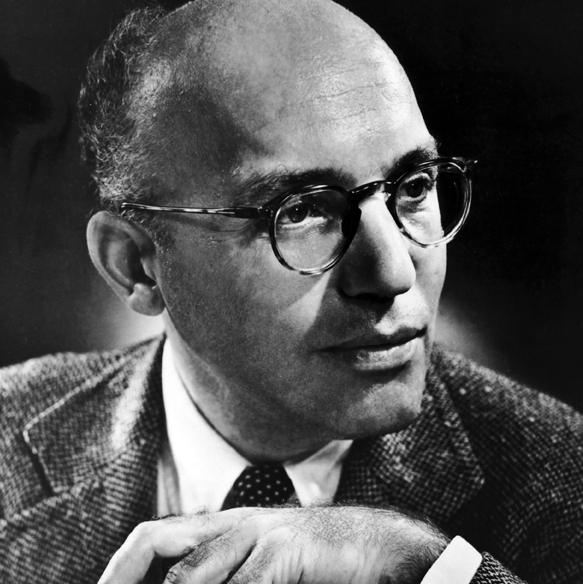Two “Highbrow” European Classical
Composers Go “Lowbrow”
VERNON DUKE (1903-1969)
KURT WEILL (1900-1950)

This Lecture-in-Song explores yet another remarkable example of classically trained European artists breathing the bracing oxygen of American freedom. Beginning in the 1890s, America’s Golden Age of Operetta was fired by the trio of Irish cellist Victor Herbert, Czechoslovakian pianist Rudolf Friml, and Hungarian conductor Sigmund Romberg. As the homegrown Gershwin, Kern, Berlin, Rodgers & Porter were creating the modern, distinctively new all-American Musical Theatre in the 1920s, these classicists were simultaneously beguiling audiences with the Old World charm and classical melodies of light comic operas.
It was American revolutionary George Gershwin who counseled a high-brow Russian émigré named Vladimir Dukelsky not to “be afraid to go low-brow.” The advice was taken, and going by the name Vernon Duke, this talented melodist added such distinguished classics to the American Popular Song repertoire as “April in Paris,” “Autumn in New York,” “What Is There To Say?”, “I Like The Likes of You,” “I Can’t Get Started,” the Broadway score for CABIN IN THE SKY [“Taking a Chance on Love” “Honey in the Honeycomb”], “Roundabout.”
German-born Kurt Weill began his career in Europe writing heavily political, harsh operatic screeds [THREE PENNY OPERA, MAHAGONNY]. Fleeing the Nazis, Weill would settle with his wife Lotte Lenya in America, giving expression to an entirely different, sweeter musical voice: KNICKERBOCKER HOLIDAY (1937, with Maxwell Anderson, “September Song,” “It Never Was You”); LADY IN THE DARK (1941, with Ira Gershwin, “My Ship,” “The Saga Of Jenny”); ONE TOUCH OF VENUS (1943, with Ogden Nash, “Speak Low”); STREET SCENE; LOVE LIFE (1948, with Alan Jay Lerner, “Here I’ll Stay”); LOST IN THE STARS (1949, with Maxwell Anderson, “Lost In The Stars,” “The Little Grey House,” “Stay Well.”)
OLD WORLD, NEW WORLD tells yet another American success story. Like the generation of immigrants and their children who created the entertainment industry at the dawn of the twentieth century, the respective careers of latecomers Kurt Weill and Vernon Duke provide yet another bright chapter in this exciting, ongoing epic.
If you would like to engage Fred Miller for one of his Lectures-in-Song, please contact him directly at any time. For a full listing of all Lectures, click here.
Fred Miller’s Lectures-In-Song comprise a series of solo programs, each an historical, anecdotal and musical profile of some great personality or important aspect of American Popular Song. These Lectures are delivered by singer/pianist/narrator Miller at the piano, and each reflects his lifetime passion and appreciation for great music. He studied classical piano in his hometown of Albuquerque from ages 7-15 but early on gave up any notion of music as a profession. At that time, Fred assumed a musical career was either one devoted to the rigid discipline of classical music or being a freewheeling rock star, and he accurately decided he had no aptitude for either. However, at age 22, upon hearing Ella Fitzgerald sing Cole Porter, he found his calling and life’s mission.
Through the Seventies and Eighties, Miller studied and absorbed in minute detail the life and times and songs of nearly all the great American composers and lyricists who thrived during Broadway & Hollywood’s Golden Age between the two World Wars. In 1987, he founded Silver Dollar Productions in order to produce operettas, dramas, musicals and small cabarets. Silver Dollar Productions required ensemble casts, props, costumes and, most significantly, the challenges of publicity and selling tickets, and for a dozen busy years, the company presented an unbroken string of varied and highly lauded performances.
In 1999, Miller was simultaneously underwritten by both his local Hunterdon County Library and the Art Alliance of Philadelphia to present a series of six solo Lectures-In-Song, each devoted to one of the premiere Broadway/Hollywood songwriters: George Gershwin, Cole Porter, Irving Berlin, Richard Rodgers, Jerome Kern, and Harold Arlen.
In presenting history, biography and psychology while sitting at a piano singing the superlative songs of his heroes, Miller has found a single performing medium that utilizes most of his intellectual and musical passions.The list of Lectures-In-Song that began with six in 1999 is now more than seventy(and growing!), a joyful tribute to the boundlessly rich field of American Popular Song.
